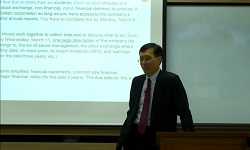The objectives and rules of recognizing accounting income are different from those of recognizing taxable income, and this makes accounting income different from taxable income. That is, there are book-tax differences (hereinafter BTD). BTD are classi...
http://chineseinput.net/에서 pinyin(병음)방식으로 중국어를 변환할 수 있습니다.
변환된 중국어를 복사하여 사용하시면 됩니다.
- 中文 을 입력하시려면 zhongwen을 입력하시고 space를누르시면됩니다.
- 北京 을 입력하시려면 beijing을 입력하시고 space를 누르시면 됩니다.
https://www.riss.kr/link?id=A99865072
- 저자
- 발행기관
- 학술지명
- 권호사항
-
발행연도
2013
-
작성언어
-
- 주제어
-
KDC
300
-
등재정보
KCI우수등재,SCOPUS
-
자료형태
학술저널
- 발행기관 URL
-
수록면
95-132(38쪽)
-
KCI 피인용횟수
4
- 제공처
- 소장기관
-
0
상세조회 -
0
다운로드
부가정보
다국어 초록 (Multilingual Abstract)
The objectives and rules of recognizing accounting income are different from those of recognizing taxable income, and this makes accounting income different from taxable income. That is, there are book-tax differences (hereinafter BTD). BTD are classified into temporary differences and permanent differences. Temporary differences arise because managerial discretion is permitted in recognizing the periodic accounting income, whereas objectivity is important in recognizing the periodic taxable income. In other words, temporary differences reflect differences in the timing of recognition that will reverse in the future. On the contrary, permanent differences arise because the concept and scope of accounting income are different from those of taxable income, and so, they do not reverse in the future.
참고문헌 (Reference)
1 박경호, "회계이익-세무이익의 차이와 보수주의" 한국세무학회 27 (27): 345-374, 2010
2 김영철, "회계이익과 세무이익의 차이와 이익의 질" 한국세무학회 28 (28): 87-119, 2011
3 김영철, "회계이익과 세무이익의 차이와 이익성장성" 한국세무학회 28 (28): 107-140, 2011
4 김철환, "회계이익과 과세소득의 차이와 이익의 가치관련성" 한국세무학회 27 (27): 77-108, 2010
5 전규안, "회계이익과 과세소득의 차이 계산시 과세소득의 측정방법에 관한 연구" 한국세무학회 9 (9): 167-190, 2008
6 신승묘, "조세부담이 부채수준에 미치는 영향과 한계세율의 내생성" 한국회계학회 30 (30): 1-32, 2005
7 고종권, "재무이익-세무이익 차이의 세부구성항목을 이용한 적자회피 이익조정 분석" 한국세무학회 23 (23): 65-102, 2006
8 배종일, "재무보고이익과 세무보고이익 차이의 정보유용성에 관한 연구-이익성장성과 주가수익률을 중심으로-" 한국세무학회 26 (26): 169-197, 2009
9 고종권, "재무보고이익-세무보고이익의 차이와 이익, 현금흐름 및 발생액의 지속성과 자본시장의 반응" 한국회계학회 31 (31): 127-162, 2006
10 주인기, "이익조정 행위의 측정치로서 회계이익과 과세소득 차이의 유용성에 관한 연구" 한국회계학회 30 (30): 237-275, 2005
1 박경호, "회계이익-세무이익의 차이와 보수주의" 한국세무학회 27 (27): 345-374, 2010
2 김영철, "회계이익과 세무이익의 차이와 이익의 질" 한국세무학회 28 (28): 87-119, 2011
3 김영철, "회계이익과 세무이익의 차이와 이익성장성" 한국세무학회 28 (28): 107-140, 2011
4 김철환, "회계이익과 과세소득의 차이와 이익의 가치관련성" 한국세무학회 27 (27): 77-108, 2010
5 전규안, "회계이익과 과세소득의 차이 계산시 과세소득의 측정방법에 관한 연구" 한국세무학회 9 (9): 167-190, 2008
6 신승묘, "조세부담이 부채수준에 미치는 영향과 한계세율의 내생성" 한국회계학회 30 (30): 1-32, 2005
7 고종권, "재무이익-세무이익 차이의 세부구성항목을 이용한 적자회피 이익조정 분석" 한국세무학회 23 (23): 65-102, 2006
8 배종일, "재무보고이익과 세무보고이익 차이의 정보유용성에 관한 연구-이익성장성과 주가수익률을 중심으로-" 한국세무학회 26 (26): 169-197, 2009
9 고종권, "재무보고이익-세무보고이익의 차이와 이익, 현금흐름 및 발생액의 지속성과 자본시장의 반응" 한국회계학회 31 (31): 127-162, 2006
10 주인기, "이익조정 행위의 측정치로서 회계이익과 과세소득 차이의 유용성에 관한 연구" 한국회계학회 30 (30): 237-275, 2005
11 문예영, "세무정보가 기업의 신용평가에 미치는 영향" 한국세무학회 12 (12): 245-277, 2011
12 박종일, "세금비용과 이익조정이 회계이익과 과세소득의 차이에 미치는 영향" 한국회계학회 27 (27): 81-116, 2002
13 신현걸, "상장법인의 세무조정 현황 실증분석" 한국세무학회 19 (19): 7-194, 2002
14 박승식, "기업지배구조와 이익조정의 관련성에 대한 실증연구" 한국회계정보학회 24 (24): 213-241, 2006
15 Pinegar, J.M., "What Managers Think of Capital Structure Thoery: A Survey" 18 : 82-91, 1989
16 Rajan, R.G., "What Do We Know about Capital Structure Choice? Some Evidence from International Data" 50 : 1421-1460, 1995
17 Kemsley, D., "Valuation of the Debt Tax Shield" 57 : 2045-2073, 2002
18 Graham, J.R., "The Theory and Practice of Corporate Finance: Evidence from the Field" 60 : 187-243, 2001
19 Manzon, G., "The Relation between Financial and Tax Reporting Measures of Income" 55 : 175-214, 2002
20 Barclay, M.J., "The Priority Structure of Corporate Liabilities" 50 : 899-917, 1995
21 Hanlon, M., "The Persistence and Pricing of Earnings, Accruals, and Cash Flows When Firms Have Large Book-tax Differences" 80 (80): 137-166, 2005
22 Francis, J., "The Market Pricing of Accrual Quality" 39 : 295-327, 2005
23 Smith, C., "The Investment Opportunity Set and Corporate Financing, Dividend and Compensation Policies" 32 : 263-292, 1992
24 Mills, L., "The Influence of Tax and Non-tax Costs on Book-Tax Reporting Differences: Public and Private Firms" 23 (23): 1-19, 2001
25 Crabtree, A., "The Influence of Differences in Taxable Income and Book Income on the Bond Credit Market" 31 (31): 75-99, 2009
26 Opler, T., "The Determinants and Implications of Corporate Cash Holdings" 52 : 3-46, 1999
27 Myers, S. C, "The Capital Structure Puzzle" 39 : 575-592, 1984
28 Flath, D., "Taxes, Failure Costs and Optimal Industry Capital Structure: An Empirical Test" 35 : 99-117, 1980
29 Lev, B., "Taxable Income, Future Earnings, and Equity Values" 79 (79): 1039-1074, 2004
30 Ayers, B., "Taxable Income as a Performance Measure: The Effects of Tax Planning and Earnings Quality" 26 (26): 15-54, 2009
31 Blaylock, B., "Tax Avoidance, Large Positive Temporary Book-Tax Differences, and Earnings Persistence" 87 (87): 91-120, 2012
32 Froot, K.A., "Risk Management: Coordinating Corporate Investment and Financing Policies" 48 : 1629-1658, 1993
33 DeAngelo, H., "Optimal Capital Structure under Corporate and Personal Taxation" 8 : 3-29, 1980
34 Gleason, C., "Materiality and Contingent Tax Liability Reporting" 77 (77): 317-342, 2002
35 Bhojraj, S., "How Does the Corporate Bond Market Value Capital Investments and Accruals?" 14 : 31-62, 2007
36 Penman, S., "Financial Statement Analysis and Equity Valuation" McGraw-Hill 2001
37 Resvine, L., "Financial Reporting and Analysis" Prentice Hall 1999
38 Hanlon, M., "Evidence for the Possible Information Loss of Conforming Book Income and Taxable Income" 48 : 407-442, 2005
39 Phillips, J., "Earnings Management: New Evidence Based on Deferred Tax Expense" 78 (78): 491-521, 2003
40 Ferri, M.G., "Determinants of Financial Structure: A New Methodological Approach" 34 : 631-644, 1979
41 Myers, S.C., "Determinants of Corporate Borrowing" 5 : 147-176, 1977
42 Graham, J.R., "Debt, Leases, Taxes, and the Endogeneity of Corporate Tax Status" 53 : 131-162, 1998
43 Graham, J. R., "Debt and the Marginal Tax Rate" 41 : 41-73, 1996
44 Ayers, B., "Credit Ratings and Taxes: The Effect of Book/Tax Differences on Ratings Changes" 27 (27): 359-402, 2010
45 Shevlin, T, "Corporate Tax Shelters and Book-Tax Differences" 55 : 427-443, 2002
46 Graham, J., "Corporate Misreporting and Bank Loan Contracting" 88 : 44-61, 2008
47 Myers, S.C., "Corporate Financing and Investment Decisions When Firms Have Information that Investors Do Not" 13 : 187-221, 1984
48 Palepu, K., "Business Analysis and Valuation: Using Financial Statements" South Western College Publications 2000
49 Joos, P., "Book-Tax Differences and the Value Relevance of Earnings" Massachusetts Institute of Technology, Indiana University and INSEAD 2000
50 Jackson, M., "Book-Tax Differences and Earnings Growth" University of Nevada 2011
51 Anderson, R., "Board Characteristics, Accounting Report Integrity, and the Cost of Debt" 37 : 315-342, 2004
52 Amir, E., "Auditor Independence and the Cost of Capital Before and After SOX: The Case of Newly Issued Public Debt" 19 (19): 633-664, 2010
53 Stultz, R., "An Analysis of Secured Debt" 14 : 501-521, 1985
54 Kraus, A., "A State-Preference Model of Optimal Financial Leverage" 28 : 911-922, 1973
55 Hanlon, M., "A Review of Tax Research" 50 : 127-178, 2010
동일학술지(권/호) 다른 논문
-
- 한국회계학회
- 전영순 ( Young Soon Cheon )
- 2013
- KCI우수등재,SCOPUS
-
- 한국회계학회
- 윤순석 ( Soon Suk Yoon )
- 2013
- KCI우수등재,SCOPUS
-
- 한국회계학회
- 최현정 ( Hyun Jung Choi )
- 2013
- KCI우수등재,SCOPUS
-
- 한국회계학회
- 손혁 ( Hyuk Shawn )
- 2013
- KCI우수등재,SCOPUS
분석정보
인용정보 인용지수 설명보기
학술지 이력
| 연월일 | 이력구분 | 이력상세 | 등재구분 |
|---|---|---|---|
| 2020 | 평가예정 | 계속평가 신청대상 (등재유지) | |
| 2015-01-01 | 평가 | 우수등재학술지 선정 (계속평가) | |
| 2011-01-01 | 평가 | 등재학술지 유지 (등재유지) |  |
| 2009-01-01 | 평가 | 등재학술지 유지 (등재유지) |  |
| 2007-01-01 | 평가 | 등재학술지 유지 (등재유지) |  |
| 2005-01-01 | 평가 | 등재학술지 유지 (등재유지) |  |
| 2002-01-01 | 평가 | 등재학술지 선정 (등재후보2차) |  |
| 1999-07-01 | 평가 | 등재후보학술지 선정 (신규평가) |  |
학술지 인용정보
| 기준연도 | WOS-KCI 통합IF(2년) | KCIF(2년) | KCIF(3년) |
|---|---|---|---|
| 2016 | 1.96 | 1.96 | 2.48 |
| KCIF(4년) | KCIF(5년) | 중심성지수(3년) | 즉시성지수 |
| 2.65 | 2.74 | 5.829 | 0.22 |






 KISS
KISS







